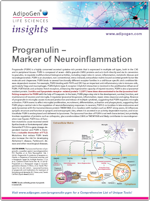

Vinci-Biochem S.r.l.
Via Ponte di Bagnolo, 10
50059 Vinci (Firenze)
Tel. +39 0571 568 147
vb@vincibiochem.it
https://www.vincibiochem.it

Crescente interesse
per questa proteina da parte dei Ricercatori
impegnati nelle malattie neurodegenerative e non
solo:
|
•
Frontotemporal Lobar Degeneration
(FTLD)
•
Huntingdon's disease
•
Metabolism
•
Alzheimer’s Disease (AD)
•
Schizophrenia
• Bipolar
disorder (BPD)
•
Semantic Dementia (SD)
•
Progressive Non-Fluent Aphasia (PNFA)
•
Alzheimer's disease (AD)
|
•
Visceral Obesity, Elevated Plasma
Glucose, and Dyslipidemia
• Wound
Healing
•
Cartilage Repair
•
Inflammation/Neuroinflammation Modulator
•
Mitogenic and Tumor Promoting Effects
• Breast
Cancer
•
Epithelial Ovarian Cancer (EOV)
•
Hepatocellular Carcinoma (HCC)
•
Cholangiocarcinom (CCA)
•
Nonalcoholic Fatty Liver Disease
(NAFLD)
|
|
Tag-free Progranulins – Unique Tools for in vivo Research
• Higher activity compared to tagged
Progranulins
• Suitable for in vitro and in vivo studies
• Reflects the native sequence with no
additional amino acids
• Correct processed protein (at the
N-terminus)
• Affinity purified
• Low endotoxin levels (<0.1EU/μg) |
Adipogen Life Sciences Progranulin
|
|
Progranulin (mouse) (rec.) (untagged) (BULK)
Produced in
HEK293 cells. Signal peptide and mouse
progranulin (aa 1-589) is untagged. Reflects
the native sequence with no additional aa.
Purity: ≥95% (SDS-PAGE). Endotoxin Content:
<0.1EU/μg protein (LAL-test).
AG-40A-0189
|
Progranulin (human) (rec.) (untagged) (BULK)
Produced in
HEK293 cells. Signal peptide and human
progranulin (aa 1-593) is untagged. Reflects
the native sequence with no additional aa.
Purity: ≥95% (SDS-PAGE). Endotoxin Content:
<0.1EU/μg protein (LAL-test).
AG-40A-0188
|
|
Progranulin (rat) (rec.) (untagged)
Sequence
Signal peptide and rat progranulin (aa
1-602) is untagged. Reflects the native
sequence with no additional aa. Purity
≥90% (SDS-PAGE). Endotoxin Content
<0.1EU/μg purified protein (LAL test). MW:
~65kDa (SDS-PAGE)
AG-40A-0196
|
Progranulin (human) ELISA Kit (THE STANDARD)
Crossreactivity: Human Sample Type: Cell
Culture Supernatant, Plasma, Serum Assay
Type: Sandwich Detection Type: Colorimetric
AG-45A-0018
96 wells /
2 x 96 wells / 5 x 96 wells
|
|
Progranulin (rat) ELISA Kit
Crossreactivity: Rat Sample Type: Cell
Culture Supernatant, Serum Assay Type:
Sandwich Detection Type: Colorimetric
AG-45A-0043
96 wells /
2 x 96 wells / 5 x 96 wells
|
Progranulin (mouse) ELISA Kit
Crossreactivity: Mouse Sample Type: Cell
Culture Supernatant, Serum Assay Type:
Sandwich Detection Type: Colorimetric
AG-45A-0019
96 wells /
2 x 96 wells / 5 x 96 wells
|
|
Progranulin (human) (rec.)
AG-40A-0068
|
Progranulin (mouse) (rec.)
AG-40A-0080
|
|
Progranulin (rat) (rec.)
MW: ~65kDa
(SDS-PAGE)
AG-40A-0194
|
anti-Progranulin (human), mAb (PG359-7)
Crossreactivity: Human
AG-20A-0052
|
|
anti-Progranulin (human), pAb
Crossreactivity: Human
AG-25A-0112
|
anti-Progranulin (mouse), pAb
Crossreactivity: Mouse
AG-25A-0093
|
|
anti-Progranulin (mouse), mAb (PG319-1)
Crossreactivity: Mouse
AG-20A-0077
|
|
Selected Review Articles
• Low plasma progranulin levels predict
progranulin mutations in frontotemporal lobar
degeneration: R. Ghidoni, et al.; Neurology 71,
1235 (2008)
• Progranulin: normal function and role in neurodegeneration: J.L. Eriksen & I.R. Mackenzie; J. Neurochem. 104, 287 (2008)
• The granulin gene family: from cancer to dementia: A. Bateman & H.P. Bennett; Bioassays 31, 1245 (2009)
• Serum biomarker for progranulin-associated frontotemporal lobar degeneration: K. Sleegers, et al.; Ann. Neurol. 65, 603 (2009)
• The molecular basis of frontotemporal dementia: M. Neumann, et al.; Expert Rev. Mol. Med. 11, (2009)
• Nomenclature and nosology for neuropathologic subtypes of frontotemporal lobar degeneration: an update: I.R. Mackenzie, et al.; Acta Neuropathol. 119, 1 (2010)
• Sorting out frontotemporal dementia? J. Lewis & T.E. Golde; Neuron 68, 601 (2010)
• Structure, function, and mechanism of progranulin; the brain and beyond: H. Toh, et al.; J. Mol. Neurosci. 45, 538 (2011)
• Cellular effects of progranulin in health and disease: L. De Muynck & P. Van Damme; J. Mol. Neurosci. 45, 549 (2011)
• Progranulin and TDP-43: Mechanistic Links and Future Directions: S. Kumar-Singh; J. Mol. Neurosci. 45, 561 (2011)
• Progranulin: A promising therapeutic target for rheumatoid arthritis: C.J. Liu; FEBS Lett. 585, 3675 (2011)
• Progranulin: A growth factor, a novel TNFR ligand and a drug target: C.J. Liu & X. Bosch; Pharmacol. Ther. (2011)
• Optimal Plasma Progranulin Cutoff Value for Predicting Null Progranulin Mutations in Neurodegenerative Diseases: A Multicenter Italian Study: R. Ghidoni, et al.; Neurodegener. Dis. (2011)
• Frontotemporal Lobar Degeneration. Adv Exp Med Biol. Premi E, Padovani A, Borroni B. (2012)
• Behavioral Genetics of Neurodegenerative Disorders. Galimberti D, Scarpini E. Curr Top Behav Neurosci. (2012)
• Losing protein in the brain: the case of progranulin. Ghidoni R, , et al., Brain Res. (2012)
• TDP-43 and FUS RNA-binding proteins bind distinct sets of cytoplasmic messenger RNAs and differently regulate their post-transcriptional fate in motoneuron-like cells.Colombrita C., et al., J Biol Chem. (2012)
• Progranulin gene variability and plasma levels in bipolar disorder and schizophrenia. Galimberti D, et al., Reif A. PLoS One. (2012)
• Optimal plasma progranulin cutoff value for predicting null progranulin mutations in neurodegenerative diseases: a multicenter Italian study.Ghidoni R., et al., Neurodegener Dis. (2012)
• Genetics of frontotemporal lobar degeneration. Galimberti D, Scarpini E. Front Neurol. (2012)
• Progranulin gene (GRN) promoter methylation is increased in patients with sporadic frontotemporal lobar degeneration. Galimberti D., et al., Neurol Sci. (2012)
• Clinical phenotypes and genetic biomarkers of FTLD. Galimberti D, Scarpini E. J Neural Transm. (2012)
• Frontotemporal lobar degeneration: current knowledge and future challenges. Cerami C., et al., J Neurol. (2012)
• Prevalence of frontotemporal lobar degeneration in an isolated population: the Vallecamonica study. Gilberti N., et al., Neurol Sci. (2012)
• Circulating progranulin as a biomarker for neurodegenerative diseases. Ghidoni R., et al., Am J Neurodegener Dis. (2012)
• The progranulin (GRN) Cys157LysfsX97 mutation is associated with nonfluent variant of primary progressive aphasia clinical phenotype. Caso F., et al., J Alzheimers Dis. (2012)
• Gender Effects on Plasma PGRN Levels in Patients with Alzheimer's Disease: A Preliminary Study. Piscopo P., et al., J Alzheimers Dis. (2013)
• Estimating the age of the most common Italian GRN mutation: walking back to Canossa times. Benussi L., et al., J Alzheimers Dis. (2013)
• Progranulin: normal function and role in neurodegeneration: J.L. Eriksen & I.R. Mackenzie; J. Neurochem. 104, 287 (2008)
• The granulin gene family: from cancer to dementia: A. Bateman & H.P. Bennett; Bioassays 31, 1245 (2009)
• Serum biomarker for progranulin-associated frontotemporal lobar degeneration: K. Sleegers, et al.; Ann. Neurol. 65, 603 (2009)
• The molecular basis of frontotemporal dementia: M. Neumann, et al.; Expert Rev. Mol. Med. 11, (2009)
• Nomenclature and nosology for neuropathologic subtypes of frontotemporal lobar degeneration: an update: I.R. Mackenzie, et al.; Acta Neuropathol. 119, 1 (2010)
• Sorting out frontotemporal dementia? J. Lewis & T.E. Golde; Neuron 68, 601 (2010)
• Structure, function, and mechanism of progranulin; the brain and beyond: H. Toh, et al.; J. Mol. Neurosci. 45, 538 (2011)
• Cellular effects of progranulin in health and disease: L. De Muynck & P. Van Damme; J. Mol. Neurosci. 45, 549 (2011)
• Progranulin and TDP-43: Mechanistic Links and Future Directions: S. Kumar-Singh; J. Mol. Neurosci. 45, 561 (2011)
• Progranulin: A promising therapeutic target for rheumatoid arthritis: C.J. Liu; FEBS Lett. 585, 3675 (2011)
• Progranulin: A growth factor, a novel TNFR ligand and a drug target: C.J. Liu & X. Bosch; Pharmacol. Ther. (2011)
• Optimal Plasma Progranulin Cutoff Value for Predicting Null Progranulin Mutations in Neurodegenerative Diseases: A Multicenter Italian Study: R. Ghidoni, et al.; Neurodegener. Dis. (2011)
• Frontotemporal Lobar Degeneration. Adv Exp Med Biol. Premi E, Padovani A, Borroni B. (2012)
• Behavioral Genetics of Neurodegenerative Disorders. Galimberti D, Scarpini E. Curr Top Behav Neurosci. (2012)
• Losing protein in the brain: the case of progranulin. Ghidoni R, , et al., Brain Res. (2012)
• TDP-43 and FUS RNA-binding proteins bind distinct sets of cytoplasmic messenger RNAs and differently regulate their post-transcriptional fate in motoneuron-like cells.Colombrita C., et al., J Biol Chem. (2012)
• Progranulin gene variability and plasma levels in bipolar disorder and schizophrenia. Galimberti D, et al., Reif A. PLoS One. (2012)
• Optimal plasma progranulin cutoff value for predicting null progranulin mutations in neurodegenerative diseases: a multicenter Italian study.Ghidoni R., et al., Neurodegener Dis. (2012)
• Genetics of frontotemporal lobar degeneration. Galimberti D, Scarpini E. Front Neurol. (2012)
• Progranulin gene (GRN) promoter methylation is increased in patients with sporadic frontotemporal lobar degeneration. Galimberti D., et al., Neurol Sci. (2012)
• Clinical phenotypes and genetic biomarkers of FTLD. Galimberti D, Scarpini E. J Neural Transm. (2012)
• Frontotemporal lobar degeneration: current knowledge and future challenges. Cerami C., et al., J Neurol. (2012)
• Prevalence of frontotemporal lobar degeneration in an isolated population: the Vallecamonica study. Gilberti N., et al., Neurol Sci. (2012)
• Circulating progranulin as a biomarker for neurodegenerative diseases. Ghidoni R., et al., Am J Neurodegener Dis. (2012)
• The progranulin (GRN) Cys157LysfsX97 mutation is associated with nonfluent variant of primary progressive aphasia clinical phenotype. Caso F., et al., J Alzheimers Dis. (2012)
• Gender Effects on Plasma PGRN Levels in Patients with Alzheimer's Disease: A Preliminary Study. Piscopo P., et al., J Alzheimers Dis. (2013)
• Estimating the age of the most common Italian GRN mutation: walking back to Canossa times. Benussi L., et al., J Alzheimers Dis. (2013)
Vinci-Biochem - Via Ponte di Bagnolo, 10
50059 Vinci (Firenze)
Italia
Tel. +39 0571 568 147
vb@vincibiochem.it
PRODOTTI ESCLUSIVAMENTE PER RICERCA, NON PER USO SULL'UOMO, NON PER USO DIAGNOSTICO
ALL OUR PRODUCTS ARE FOR RESEARCH USE ONLY
Copyright 2024 Vinci-Biochem
